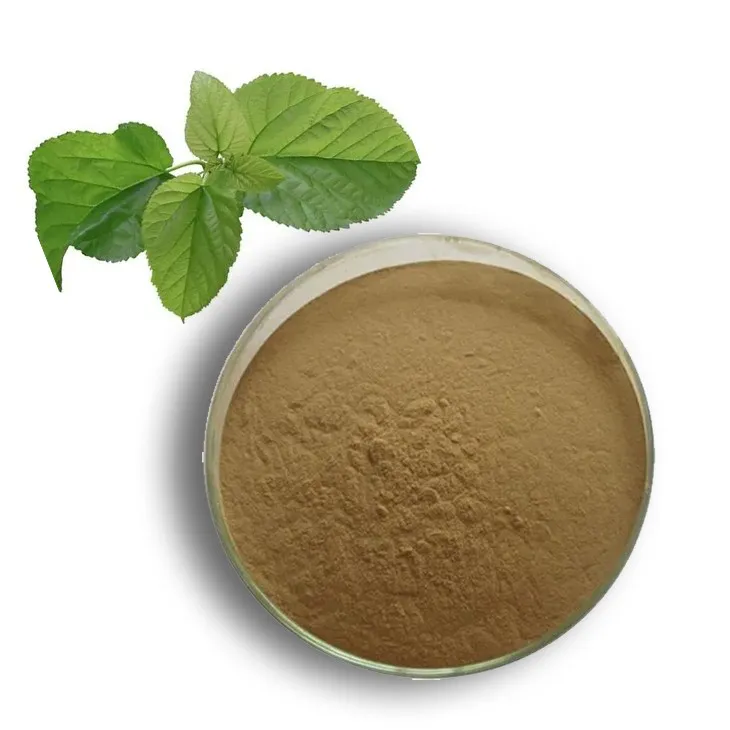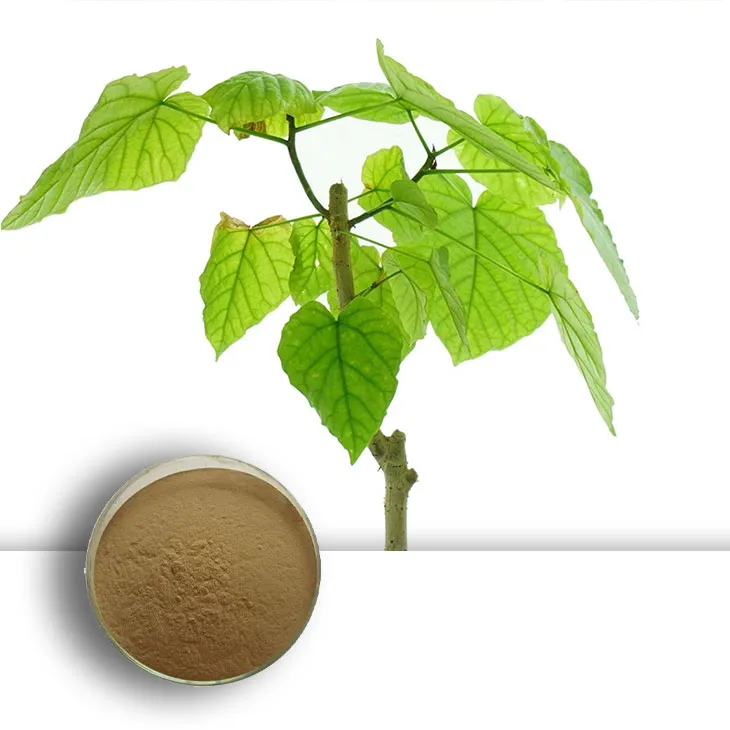- 0086-571-85302990
- sales@greenskybio.com
Mulberry Leaf Extract: Benefits, Uses and Possible Side Effects
2024-11-11

1. Introduction
The silk tree, also known as Albizia julibrissin, has been used in traditional medicine for centuries. Silk tree leaf extract is derived from the leaves of this tree and is believed to possess a variety of beneficial properties. In recent years, there has been growing interest in exploring its potential uses and understanding its associated effects, both positive and negative.

2. Goodness of Silk Tree Leaf Extract
2.1 Antioxidant Properties
One of the significant benefits of silk tree leaf extract is its antioxidant activity. Antioxidants play a crucial role in the body by neutralizing free radicals. Free radicals are unstable molecules that can cause damage to cells, leading to various health problems such as aging, cancer, and heart disease. The compounds present in silk tree leaf extract, such as flavonoids and phenolic acids, have the ability to scavenge these free radicals, thereby protecting the body's cells from oxidative stress.
2.2 Anti - inflammatory Effects
Silk tree leaf extract also exhibits anti - inflammatory properties. Inflammation is a natural response of the body to injury or infection, but chronic inflammation can be detrimental to health. Studies have shown that the extract can inhibit the production of inflammatory mediators, such as cytokines and prostaglandins. This makes it potentially useful in treating inflammatory conditions like arthritis, where reducing inflammation is key to alleviating pain and improving joint function.
2.3 Mood - enhancing Properties
Another interesting aspect of silk tree leaf extract is its potential to enhance mood. It has been suggested that the extract may act on the nervous system, perhaps by modulating neurotransmitter levels. Some traditional uses of the silk tree include treating symptoms of depression and anxiety. Although more research is needed to fully understand the mechanisms involved, preliminary studies indicate that it may have a positive impact on mood regulation.

3. Applications of Silk Tree Leaf Extract
3.1 In Traditional Medicine
In traditional medicine systems, silk tree leaf extract has been used for a variety of ailments. For example:
- It has been used to treat insomnia. The calming effects of the extract may help relax the body and mind, making it easier to fall asleep.
- For digestive problems, it was believed to have a soothing effect on the digestive tract, potentially relieving symptoms such as indigestion and stomach cramps.
- As mentioned earlier, it has also been used to address mental health issues like depression and anxiety.
3.2 In Modern Health Supplements
With the growing interest in natural health products, silk tree leaf extract is finding its way into modern health supplements.
- It is often included in antioxidant - rich supplements, given its antioxidant properties. These supplements are promoted for overall health and well - being, as antioxidants help protect the body from various diseases.
- Some supplements targeting mood improvement or stress relief also contain silk tree leaf extract. The idea is to harness its potential mood - enhancing and anti - stress effects.
3.3 In Cosmetics
The antioxidant and anti - inflammatory properties of silk tree leaf extract make it a valuable ingredient in cosmetics.
- It can be found in anti - aging creams and serums. By protecting the skin from oxidative stress and reducing inflammation, it may help to slow down the aging process, such as reducing the appearance of wrinkles and fine lines.
- Some skin - soothing products also use the extract. It can be beneficial for people with sensitive or irritated skin, as it helps to calm and heal the skin.

4. Possible Adverse Effects
4.1 Allergic Reactions
Some individuals may be allergic to silk tree leaf extract. Allergic reactions can range from mild, such as skin rashes and itching, to more severe, including difficulty breathing and swelling of the face, lips, or tongue. People with known allergies to plants in the Fabaceae family (to which the silk tree belongs) are at a higher risk of developing an allergic reaction to the extract.
4.2 Hormonal Effects
There are concerns about the potential hormonal effects of silk tree leaf extract. Some studies have suggested that it may interact with hormones in the body. For example, it could potentially affect estrogen levels, which may have implications for women's health, particularly those with hormonal - sensitive conditions such as breast cancer. However, more research is needed to fully understand these hormonal interactions and their significance.
4.3 Toxicity
Although silk tree leaf extract is generally considered safe when used appropriately, there is a possibility of toxicity at high doses. High - dose consumption may lead to adverse effects on the liver or other organs. It is important to follow recommended dosage guidelines when using products containing silk tree leaf extract.
5. Conclusion
Silk tree leaf extract has a range of potential benefits, from antioxidant and anti - inflammatory properties to mood - enhancing effects. It has various applications in traditional medicine, modern health supplements, and cosmetics. However, it is not without potential risks, including allergic reactions, possible hormonal effects, and toxicity at high doses. As with any natural product, further research is needed to fully understand its properties and ensure its safe and effective use. Consumers should also be cautious when using products containing silk tree leaf extract and consult a healthcare professional if they have any concerns.
FAQ:
What are the main benefits of silk tree leaf extract?
The silk tree leaf extract may have several benefits. It may possess antioxidant properties which can help in combating free radicals in the body. It might also have anti - inflammatory effects, potentially useful for reducing inflammation in various conditions. Additionally, it could potentially have a positive impact on the nervous system, perhaps helping with relaxation and stress reduction.
What are the common uses of silk tree leaf extract?
Silk tree leaf extract is commonly used in traditional medicine. It may be used in herbal remedies for stress - related disorders as it is thought to have anxiolytic (anti - anxiety) properties. Some also use it for its potential to improve sleep quality. In the cosmetic industry, it may be used in skincare products due to its antioxidant properties which can help in preventing skin aging.
Are there any side effects of silk tree leaf extract?
Yes, there can be possible side effects. Some people may experience allergic reactions, especially those with sensitive skin or a history of allergies. Overconsumption or improper use may lead to digestive issues such as nausea, vomiting, or diarrhea. In addition, it may interact with certain medications, so it's important to consult a healthcare provider before using it, especially if you are taking other drugs.
How should silk tree leaf extract be consumed?
The consumption method can vary. It can be taken in the form of capsules or tablets which are available as dietary supplements. Some people may also consume it as a tea made from dried silk tree leaves. However, it is crucial to follow the recommended dosage instructions provided by the manufacturer or a healthcare professional.
Can silk tree leaf extract be used during pregnancy?
It is not advisable to use silk tree leaf extract during pregnancy without consulting a doctor. There is not enough research to fully understand its effects on the developing fetus. Since it may have potential side effects and interactions, it's better to err on the side of caution and avoid using it during pregnancy.
Related literature
- The Properties and Potential Health Benefits of Silk Tree Leaf Extract"
- "Silk Tree Leaf Extract in Traditional Medicine: A Review"
- "Investigating the Side Effects of Silk Tree Leaf Extract"
- ▶ Hesperidin
- ▶ citrus bioflavonoids
- ▶ plant extract
- ▶ lycopene
- ▶ Diosmin
- ▶ Grape seed extract
- ▶ Sea buckthorn Juice Powder
- ▶ Beetroot powder
- ▶ Hops Extract
- ▶ Artichoke Extract
- ▶ Reishi mushroom extract
- ▶ Astaxanthin
- ▶ Green Tea Extract
- ▶ Curcumin Extract
- ▶ Horse Chestnut Extract
- ▶ Other Problems
- ▶ Boswellia Serrata Extract
- ▶ Resveratrol Extract
- ▶ Marigold Extract
- ▶ Grape Leaf Extract
- ▶ blog3
-
High purity olive leaf extract
2024-11-11
-
Lavender oil extraction method
2024-11-11
-
100% organic virgin sea buckthorn fruit oil
2024-11-11
-
Lotus leaf extract powder factory in China
2024-11-11
-
China aged garlic extract supplier
2024-11-11
-
Deer antler extract powder manufacturer
2024-11-11
-
Saw palmetto extract vs whole herb
2024-11-11
-
Beta Carotene
2024-11-11
-
Apricot Powder
2024-11-11
-
melatonin extract
2024-11-11
-
Green Tea Extract
2024-11-11
-
Uridine-5'-monophosphate Disodium salt
2024-11-11
-
Shikone Extract
2024-11-11
-
Kelp Extract Powder
2024-11-11
-
Diosmin
2024-11-11
-
Maitake Mushroom Extract
2024-11-11
-
Genistein
2024-11-11





















